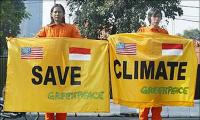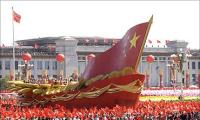Pakistan Seeks USD 4 Billion Loan from Middle East Banks
Pakistan seeks a USD 4 billion loan from Middle East banks to meet financial obligations, as the IMF approval of a USD 7 billion EFF is delayed. The country also faces high financing costs due to its low credit rating.
Islamabad, Aug 23 (PTI) Cash-strapped Pakistan is in talks with banks in the Middle East to borrow approximately USD 4 billion to meet its external financial commitments for the current fiscal year, as part of the USD 7 billion Extended Fund Facility (EFF) currently pending for IMF's approval.
Finance Minister Muhammad Aurangzeb and his team had a virtual meeting with Dr Adnan Chilwan, Group CEO of Dubai Islamic Bank, on Thursday, the Dawn newspaper reported on Friday.
On Wednesday, a similar interaction was held with Mashreq Bank President and Group CEO Ahmed Abdelaal. Both meetings had been arranged to discuss the economic outlook and explore investment opportunities in Pakistan.
For the current fiscal year, Pakistan has pitched about USD 20 billion in foreign borrowing in the budget, besides another USD 3 billion rollover from the UAE that was reported separately for the balance of payments. With this much borrowing, Pakistan's reserves are estimated to grow to about USD 19-20 billion by the end of the current fiscal year.
Of the USD 20 billion estimate, about USD 4 billion is targeted to be arranged through foreign commercial borrowing during the current fiscal year and another USD 1 billion in international bonds.
Separately, The Express Tribune newspaper reported that Pakistan begins seeking commercial loans from Middle Eastern banks to bridge the external financing gap, as the IMF indefinitely postponed the approval of a USD 7 billion EFF this week after Islamabad failed to secure the additional USD 2 billion in financing and the rollover of USD 12 billion in cash deposits from Saudi Arabia, China, and the UAE.
The finance minister now hopes that the IMF may approve the new EFF next month.
Pakistan has also intensified its engagement with foreign commercial banks, though high financing costs and a low credit rating from international agencies remain significant hurdles.
Pakistan's current credit rating stands at CCC+, which is below investment grade, leading to higher interest rate demands from commercial banks.
Meanwhile, on Thursday, the Ministry of Finance and the State Bank of Pakistan (SBP) briefed the Senate Standing Committee on Economic Affairs about Pakistan's engagements with the IMF since 1958.
Qader Bakhsh, an executive from the SBP, informed the parliamentary forum that Pakistan's last Stand-By Arrangement with the IMF had an average interest rate of 5.1 per cent, making it a costly deal. He also noted that the new IMF loan is expected to carry similar rates unless global interest rates decline.
The IMF interest rate is determined by the Special Drawing Rights (SDR) basket price, plus a 1% base rate and two additional surcharges linked to loan volume and duration, he explained.
The SBP official further detailed that if a country borrows more than 187.5 per cent of its IMF quota, a 2 per cent surcharge applies. Additionally, a 1 per cent surcharge is levied if the borrowing period exceeds three years, he said.
Traditionally, lending by the World Bank, the Asian Development Bank, and the IMF was considered affordable. However, due to Pakistan's increasing borrowing needs and limited capacity to sustain such debt, the WB and ADB have also raised their interest rates.
Data shared by the finance ministry revealed that Pakistan's interest costs on IMF loans have steadily risen since 2008. That year, Pakistan borrowed from the IMF at an interest rate of 1.6 per cent, which increased to 2.4 per cent in 2013. The 2019 IMF programme was secured at an average interest rate of 3.41 per cent.
Finance Minister Muhammad Aurangzeb and his team had a virtual meeting with Dr Adnan Chilwan, Group CEO of Dubai Islamic Bank, on Thursday, the Dawn newspaper reported on Friday.
On Wednesday, a similar interaction was held with Mashreq Bank President and Group CEO Ahmed Abdelaal. Both meetings had been arranged to discuss the economic outlook and explore investment opportunities in Pakistan.
For the current fiscal year, Pakistan has pitched about USD 20 billion in foreign borrowing in the budget, besides another USD 3 billion rollover from the UAE that was reported separately for the balance of payments. With this much borrowing, Pakistan's reserves are estimated to grow to about USD 19-20 billion by the end of the current fiscal year.
Of the USD 20 billion estimate, about USD 4 billion is targeted to be arranged through foreign commercial borrowing during the current fiscal year and another USD 1 billion in international bonds.
Separately, The Express Tribune newspaper reported that Pakistan begins seeking commercial loans from Middle Eastern banks to bridge the external financing gap, as the IMF indefinitely postponed the approval of a USD 7 billion EFF this week after Islamabad failed to secure the additional USD 2 billion in financing and the rollover of USD 12 billion in cash deposits from Saudi Arabia, China, and the UAE.
The finance minister now hopes that the IMF may approve the new EFF next month.
Pakistan has also intensified its engagement with foreign commercial banks, though high financing costs and a low credit rating from international agencies remain significant hurdles.
Pakistan's current credit rating stands at CCC+, which is below investment grade, leading to higher interest rate demands from commercial banks.
Meanwhile, on Thursday, the Ministry of Finance and the State Bank of Pakistan (SBP) briefed the Senate Standing Committee on Economic Affairs about Pakistan's engagements with the IMF since 1958.
Qader Bakhsh, an executive from the SBP, informed the parliamentary forum that Pakistan's last Stand-By Arrangement with the IMF had an average interest rate of 5.1 per cent, making it a costly deal. He also noted that the new IMF loan is expected to carry similar rates unless global interest rates decline.
The IMF interest rate is determined by the Special Drawing Rights (SDR) basket price, plus a 1% base rate and two additional surcharges linked to loan volume and duration, he explained.
The SBP official further detailed that if a country borrows more than 187.5 per cent of its IMF quota, a 2 per cent surcharge applies. Additionally, a 1 per cent surcharge is levied if the borrowing period exceeds three years, he said.
Traditionally, lending by the World Bank, the Asian Development Bank, and the IMF was considered affordable. However, due to Pakistan's increasing borrowing needs and limited capacity to sustain such debt, the WB and ADB have also raised their interest rates.
Data shared by the finance ministry revealed that Pakistan's interest costs on IMF loans have steadily risen since 2008. That year, Pakistan borrowed from the IMF at an interest rate of 1.6 per cent, which increased to 2.4 per cent in 2013. The 2019 IMF programme was secured at an average interest rate of 3.41 per cent.
You May Like To Read
TODAY'S MOST TRADED COMPANIES
- Company Name
- Price
- Volume
- Vodafone Idea L
- 8.10 (+ 18.94)
- 352105814
- GTL Infrastructure
- 1.50 (+ 7.14)
- 20982285
- G G Engineering
- 0.90 (+ 11.11)
- 20091512
- AvanceTechnologies
- 0.54 ( -8.47)
- 18780688
- YES Bank Ltd.
- 17.33 (+ 2.61)
- 14468025






 © 2025 Rediff.com India Limited. All rights reserved.
© 2025 Rediff.com India Limited. All rights reserved.